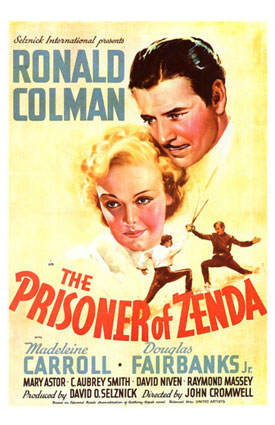
THE PRISONER OF ZENDA
US, 1937, 101 minutes, Black and white.
Ronald Colman, Douglas Fairbanks Jnr., Madeleine Carroll, David Niven, Raymond Massey, Mary Astor, C. Aubrey Smith.
Directed by John Cromwell.
The Prisoner of Zenda is a lavish costume adventure of the '30s, well received in its time and influential on a number of elegant costume swashbuckling films. Production was by David 0. Selznick, who was at the peak of his career with such productions as A Tale of Two Cities, David Copperfield and Gone With The Wind. Direction was by John Cromwell, who directed a wide range of films and also acted in his very old age in Altman's Three Women and A Wedding.
Ronald Colman is expert in the dual central role. Douglas Fairbanks Jr is dashingly amoral and laughing. Madeleine Carroll is dignified as the heroine and appeared in a number of similar roles at the time. Regulars like Sir C. Aubrey Smith, David Niven, Raymond Massey and Mary Astor make a strong supporting cast. The film was remade by Richard Thorpe in the early '50s with Deborah Kerr, Stewart Granger, James Mason. The plot was used for parody in The Great Race and in Richard Lester's Royal Flash (based on George Mac Donald Fraser's novel). A spoof version was made with Peter Sellers in the late '70s.
1. Elegant filmmaking of the '30s? Swashbuckling traditions? Classic costume spectaculars? Historical pageants? The perennial ingredients for entertainment?
2. The production values: black and white photography. sets, decor, costumes, special effects? The stars?
3. The background of 19th. century European history and intrigue? The post World War One look at the kingdoms of the 19th. and early 20th. centuries? German history and Bismarck? Britain and Europe? The make-believe world of operettas and espionage?
4. Audience familiarity with the plot? Anthony Hope's classic? Themes of identity, detection, fighting, good and evil, romance?
5. Ronald Colman's success in the dual role? As English: upright, holidays, reacting to people's reaction to him? Nobly taking his place as the King? The substitution, the discussions, his coping with the situation, learning how to act with aplomb? His kingly style? The thwarting of the villains? The clashes with them? Antoinette and her rendezvous? Flavia and her bewilderment? Colonel Zapt and Fritz and their influence? The dangers, the coronation, the confrontations with Michael, with Rupert? The fights? Rupert's ambush? Colman as the King: dissolute, irresponsible, the change, the experience of prison? The final success and sacrifice?
6. Michael as evil, black villain? His plotting? Infatuation with Antoinette and yet ready to betray her? Her grief at his death?
7. Rupert as mercenary, his laughing style, his involvement in the plot, ready to betray others, the ambush on Rudolph? The final fight and his death?
8. Flavia as heroine - Princess, charming, noticing the change, in love with Rudolph, hurt by his behaviour? Her response to the truth?
9. Antoinette as the other woman, her plan, her grief?
10. Zapt and Fritz and their plan and carrying it off?
11. Pomp, style? Identities and dangers? Poisoning and intrigue? Swashbuckling? Idealised self-sacrifice and romantic values?